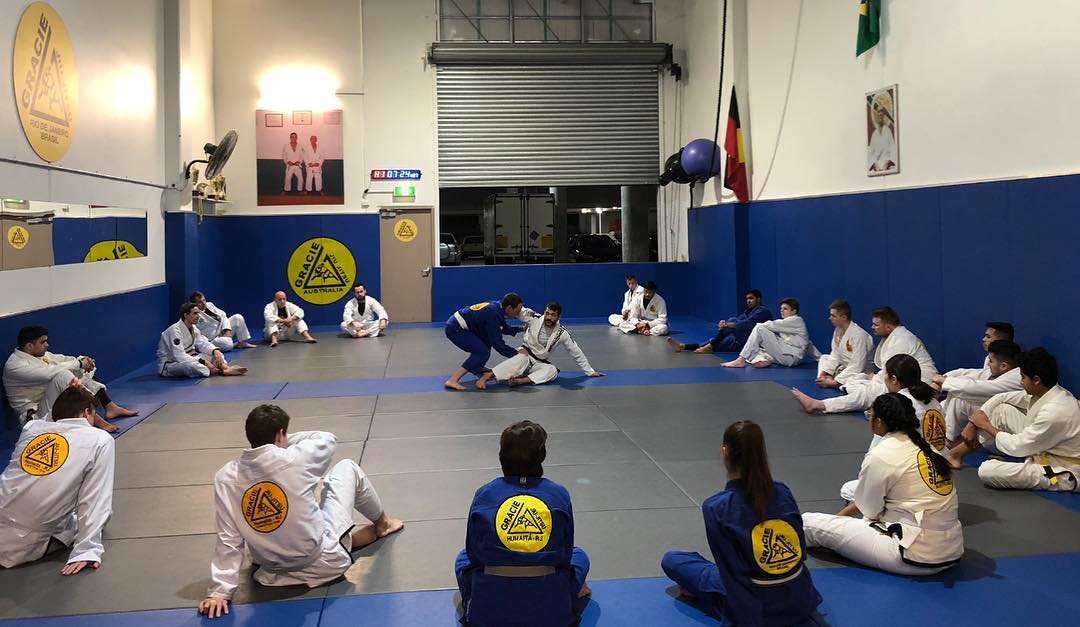Many of the men and women who train at Gracie Castle Hill started doing so because they wanted to learn a self-defence system. But while Brazilian Jiu-jitsu is a great defensive martial art, others in the Hills District practice it for gold medals rather than safety.
This harkens to a controversial topic within the BJJ world: The value of sports Jiu-jitsu.
Brazilian Jiu-jitsu’s roots are in using technique and leverage to protect oneself from larger opponents. It uses grappling techniques, rather than strikes, to create an impenetrable self-defence system.
Then in the 90s BJJ world tournaments starting popping up and people began training for sport. This has flowed on to today, where elite tournaments are held all around the world and winners are widely championed.
In short, Jiu-jitsu has become more about competition. Is this a bad thing?

Be a good sport
There’s a fundamental difference between Jiu-jitsu as a self-defence system and Jiu-jitsu as a sport. The former assumes your opponent does not train, while the latter assumes your opponent regularly trains BJJ.
As a result of that implication, sports BJJ has lead to a wave of new, complex techniques. These are primarily in the form of new guards, like worm guard, butterfly guard, spider guard and so on.
Those who criticise sports Jiu-jitsu say that many of these techniques either don’t work in real life or are counter productive to safety. The worm guard may be an effective tool to help you win a gold medal, for instance, but less useful in a real fight. This is because an opponent can strike you on the streets and may not be wearing clothing that can substitute for a Gi top.
This line of thinking is espoused by many in the older generation, who learned Jiu-jitsu when it was conceived as a self-defence system. It’s also heard from proponents of rival martial arts. However, the question of whether sports BJJ is good or bad depends on the practitioner.
What do you want out of BJJ? If you’re interested in Jiu-jitsu as a martial art for defence, you’ll likely find less benefit in drilling berimbolos. Conversely if you find the Hills District safe and are interested in competition, learning a variety of complicated guards would be of great benefit.
Why not both?
Sport BJJ teaches techniques that may not be applicable in real life, but it also accords benefits that are directly applicable.
Again, the basis of sport Jiu-jitsu is the assumption that your opponent is equally or more trained than you. This means that it’s incumbent on you to drill to improve technical precision. In doing so you’ll learn an important lesson about BJJ: Small details make a big difference.
Not only will this process teach you the positive attitude and dedication required to learn a complex skill, this insight directly translates to self-defence. In a real-life fight, small details can be the difference between a scuffle and a serious injury, for instance.
Another thing to consider is intensity of martial arts training. One of BJJ’s greatest blessings is that it allows you to train with high intensity with minimal injury risk. This is rare for a martial art. However, it’s easy to retreat to a comfort zone come sparring time.
Training for competition takes you out of that comfort zone. It encourages you to train with greater intensity, which helps both you and your partner. This is valuable even if you don’t intend on competing. Getting comfortable training at high intensity levels means the pace of a real-life skirmish will be familiar.
Finally, actual competitions. Competing isn’t mandatory in Jiu-jitsu, and you may think it’s not worth doing if your primary interest is safety. However, in many ways competition mirrors a real-life situation. Sparring usually can’t replicate the anxiety and adrenaline rush associated with competition. Feeling comfortable inside your mind while your body sends such intense stress signals isn’t just helpful in a self-defence situation. It’s also a valuable life skill.
Gracie Castle Hill offers both competition training and self-defense Jiu-jitsu, for men, women and children. Sign up for your first class here.
